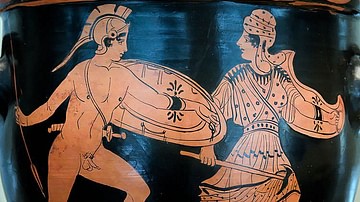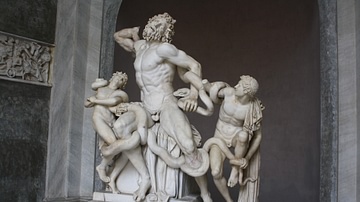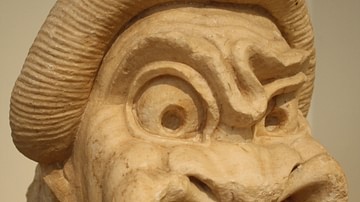Review

| Rating: | |
|---|---|
| Title: | Elektra: A Novel |
| Author: | Jennifer Saint |
| Audience: | General Public |
| Difficulty: | Easy |
| Publisher: | Flatiron Books |
| Published: | 2022 |
| Pages: | 304 |
Spanning the lead-up to the Trojan War, the war itself, and the aftermath, Jennifer Saint's novel has woven an intricate retelling of the ten-year-long siege of Troy and the Curse of the House of Atreus from the points of view of three remarkable women; Cassandra, Clytemnestra, and Elektra.
Elektra by Jennifer Saint is a novel retelling numerous popular tales from Greek mythology, including Paris of Troy stealing away Helen of Sparta, the Trojan War in response to this disrespect to Menelaus, and the aftermath of Agamemnon's return to Mycenae after the siege.
Jennifer Saint has interwoven the points of view of three women – Clytemnestra the sister of Helen of Troy, Clytemnestra's daughter Elektra, and Cassandra, a princess of Troy – to showcase these stories from a different perspective. Saint presents the Curse of Atreus and the Trojan War as being experienced by the women. We don’t read pages upon pages of bloodshed from the battle, but the effects these events had on the women in Troy and in Mycenae. Saint begins with the suitors at Sparta, gathering for the hand of the most beautiful mortal woman, Helen, and takes us through the story of Clytemnestra's marriage to Agamemnon, the king of Mycenae, and Helen's abduction by the prince of Troy. The reader is let into the mind of Cassandra, the sister of Paris and princess of Troy. By disallowing Apollo to take what he believes he deserves after granting her the gift of prophecy, she is cursed and shunned by her family and her people. The reader is brought along through death, grief, bloody revenge, and the eventual peace found by these three women with the final end to the Curse of the House of Atreus.
Nothing brought them more joy than the fall of a lovely woman. They picked over her reputation like vultures, scavenging for every scrap of flesh they could devour (87).
The most striking element of Elektra was the nuance of Saint’s retelling. Despite Cassandra, Clytemnestra, Elektra, and even Helen all being women living through war, and despite these women being on different sides of the war, Saint binds these women together through shared experiences while also conveying the varying ways people react to the same events. Elektra holds her father in the highest regard to the final page, believing his sacrifice of her sister was as the gods demanded. Meanwhile, Clytemnestra kills Agamemnon for her children, assuaging her grief for Iphigenia. In the final moments of Cassandra and Clytemnestra, the women are the same in their desire for peace. Elektra is fueled by revenge, caused by her hatred toward her mother and her belief that Cassandra was lucky to have been chosen as a slave by such a great king as her father.
I would weep for him, for us all, but I am too numb, as though I am already shrouded in the fog that drifts through the realm of Hades, that rises in vapour from the great dark rivers that flow under the earth and drain away the memories of the dead into silt so they can wander the grey shores never knowing what they have left behind (247).
This evocative retelling can be read and enjoyed by the general public, and has been written in a way that makes these ancient stories feel brand new. Saint, a novelist who also wrote a retelling of the Greek heroine Atalanta, has breathed new life into these women who traverse such grief and pain, bringing the tragedies and epics of ancient Greece into the modern readers' consciousness. This book is a great supplement for those who are familiar with the Curse of the House of Atreus and the sacking of Troy, but it can also be enjoyed by those who are only starting to dip their toes into the world of Greek mythology.
About the Reviewer
Cite This Work
APA Style
Macquire, K. (2023, June 21). Elektra: A Novel. World History Encyclopedia. Retrieved from https://www.worldhistory.org/review/370/elektra-a-novel/
Chicago Style
Macquire, Kelly. "Elektra: A Novel." World History Encyclopedia. Last modified June 21, 2023. https://www.worldhistory.org/review/370/elektra-a-novel/.
MLA Style
Macquire, Kelly. "Elektra: A Novel." World History Encyclopedia. World History Encyclopedia, 21 Jun 2023, https://www.worldhistory.org/review/370/elektra-a-novel/. Web. 29 Apr 2025.




